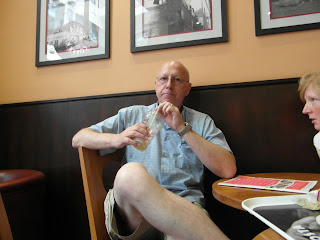
It was only the other day that Soren A Kierkegaard embarged on a review of the emerging church.
He was reminded of his earlier thoughts in as much as the wider community around him was transforming in to a theatrical exsistance and stage sets.
He had concluded that society no longer consisted of individuals or groups devided in to social hierarchy. Its make up was of an undifferentiated mass, " the public". He had concluded that the mass "the public" was most dangerous and significant in power.
It , "The Public" would march as soon as someone said march! It would never ask the least of questions which could make it seen as the power more or less proportionate to its state of anonymity..
His observation of the mass and its "great levelling" had impact in the mass psychology of the age. It would also highlight the phenomenon of alienation. With the colapse of the social pyramid ( all have stations in the paramid higher or lower.) the levelling did not lead to equallity as such but to a rivary of one another as like in a game.
One outcome of this was that place were once there had been a fear of God was now a fear of man.
Kierkegaard said " close air always becomes noxious"
So Kierkegaard walks along the street to a cafe orders a Starbucks and reflects.
He gathers some around and tells the story.
A rare treasure that is the desire of everyone is located so far out on thin ice that whoever goes out to retrieve it places himself in mortal peril. But the hero who of course dares where others are scared rushes off, attended by the breathless crowd. The crowd would tremble for him and with him in the mortal peril of this decision; it would mourn him in his death:it would deify him if he gained the treasure.
But Keirkegaard repeated the scene to the listening group. This time the crowd less breathless and more a crowd of spiritless public that rationally calculates the extent to which such a feat of daring will pay off: “ They would go out there. They would stand where it is safe and sound, and putting on the airs of experts. They would evaluate the skillful skaters who could skate almost the the outermost edge... and then turn back.
Among the skaters there would be someone or other who was exceptionally talented: he would even manage the tour de force of going to the extreme edge, making yet an other attempt, replete with the deception appearance of danger, so that the spectators shout and I translate into Scottish ,
Dinne da that yur mad.... he's risking his life!.
But see he was remarkably skilled that in fact he was able to turn away at the extreme outermost edge, that is where the ice is still quite safe and the mortal peril has not yet begun.
Just as in the theatre the crowd would shout out “bravo” and salute him with acclaim; they would return home, bringing with them the great heroicness artist, and they would honour him with a sumptuous banquet. Reasonableness had come to predominate that it had transformed the challenge itself into an unreal stunt and reality into theatre.
While the passionate hero had been honoured because he alone ventured where none of the others dared go, the hero of reasonableness was celebrated because he understood how to simulate the seriousness of the danger – that is, how to “transform an inspired feat of daring into a stunt”. A twisted transformation of this sort is greeted with approval because, first of all, collective self-deception is easier to endure than envy of that single individual, and second, levelling has broken down the representative function formerly exercised by the hero in the days when he could “exalt the idea of what it is to be a human being”.
And the emerging church as it skates to the outerlimit not because it is there but to collect the rare treasure " the desire of everone" can continue to be passionate.
Then the establishment may not try and "level it out."
We so need feats of daring and not calculated stunts.
So I am left with the conclusion that Kierkgaard is most comfortable with the discourses happening around the globe as christian discover the Church is far more than a building or a group of likeminded people who are religious.
May the skating be spectacular.





